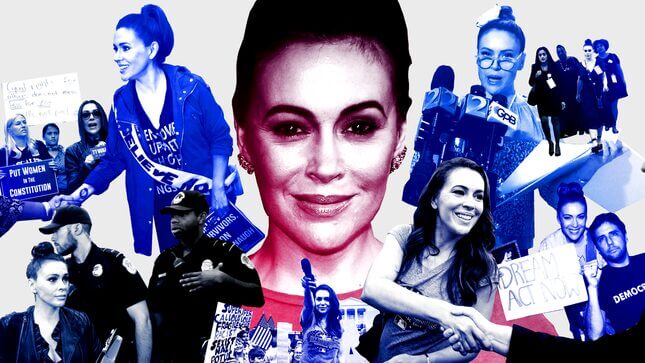The Strange Political Ascent of Alyssa Milano
Latest
Illustration: Elena Scotti
On April 21, 2010, Us Weekly ran an article that was simply titled: “Alyssa Milano: She’s Back!” The actor had spent the years since Charmed ended in a familiar post-network-series purgatory, taking bit parts in sitcoms and doing TV movies. She wore a cabbage dress for PETA and wrote blogs for MLB.com. (“Touch,” an exclusive line of jerseys for women, was sold alongside her various posts on the Dodgers.)
The ABC vehicle Milano was pushing at the time, Romantically Challenged, ran for only four episodes, but the coverage of her in the tabloids remained steady: a sampling of headlines about Milano, taken from People, Us Weekly, and Life & Style between the years of 2010 and 2013 include: “Inside Alyssa Milano’s Baseball-Themed Baby Shower”; “Alyssa Milano Baby Joy: My Heart Has Tripled in Size”; “Halle Berry Shares Mommy Tips With Pregnant Alyssa Milano”; “Alyssa Milano: Son Milo ‘Started Talking at 4 Months’”; and “Milano Pumped Breast Milk Every Two Hours On Set of Mistresses.” Despite relatively minor jobs, like ABC’s Mistresses and a hosting gig on Project Runway: All Stars, the renewed tabloid interest in her life as a mother kept her firmly in the public’s attention.
In the interview with Us Weekly, Milano shared harmless anecdotes: that time she tap danced on Who’s the Boss?, turning down Dancing With the Stars, life as a married woman. Albeit a meaningless interaction between a tabloid and the star of a show desperately in need of promotion, this interview would land Milano in the center of a crucial change in public life. By the time Us Weekly announced “She’s back!” tabloid culture had been cannibalized by social media. With the details of their relatively average existence in hand—motherhood and a television career—Twitter and Instagram gave celebrities swathes of territory unrestricted by silly anecdotes shared with late night hosts. Alyssa Milano staked her claim quickly in this new land.
To understand Alyssa Milano’s rise to political prominence, you first have to look to the tabloid culture of the early 2000s.
But recent years have seen Milano’s career and the press around it turn expressly political. In the nearly two years since she tweeted “me too” as a response to the sexual assault and rape allegations against Harvey Weinstein, she has become a central celebrity figure in the expanded Democratic universe. She has advocated for abortion rights, launched a failed sex strike, and recently announced an appearance at a Marianne Williamson campaign fundraiser (somewhere on the astral plane). Fans call her a fearless advocate for justice, the president’s press secretary thinks she “doesn’t matter,” and Twitter ignites with discourse every time she logs on.
The transformation has been strange to watch: Her biggest acting jobs of the past few years, besides a lead in a play based on the Mueller report, were widely maligned. And yet she is, somehow, everywhere. Her well-documented advocacy cannot be denied—and there’s no reason to doubt the good intentions that motivate it. But does Milano’s place in the wider anti-Trump “resistance”—and celebrity activism more generally—actually mean anything?
To understand Alyssa Milano’s rise to political prominence, you first have to look to the tabloid culture of the early 2000s. It was the aughts. Instagram influencers, who’d eventually wrestle the internet to the ground, were a decade off. But there were still products to sell, shows to promote, and opinions to manage. So their ancestors—the weekly print tabloid—were the primary conduit between celebrities and the public imagination. Through them, the particular conservatism of a post-9/11 America bled into our celebrity culture in increasingly bizarre ways. The Jonas Brothers wore purity rings. “Christian celebrities” were bountiful. Elisabeth Hasselbeck argued against Rosie O’Donnell about supporting the troops.
Women in Hollywood were still finding their voice on the greater cultural stage. Many twenty-something starlets of the time would eventually go on to lead the conversation against Hollywood’s ageism against women, but the film industry was still closing its doors on women in their 30s and 40s in service of the next generation of intangibly beautiful people. So when the aughts came, and ’90s starlets were no longer giggling ingenues, they might disappear off the map or play someone’s mother on a cable drama! Alternatively, they could turn the lens elsewhere—their own lives as mothers.
With their politics usually obscured by a deference to supposedly more universal personal experiences, celebrities suddenly found themselves becoming the most looked-to voices on a defining cultural shift.
Celebrity motherhood, then as now, was a point of public fixation, and the tabloids reflected it. This was especially true for Milano. As conversations on the dynamic between women and their supposed “places” evolved, so too did celebrity coverage around the everyday habits of the working mother. In 2012, the paparazzi snapped photos of Milano with her son on the set of Mistresses. At the time, she tweeted: “Letting Milo take a nap in my arms before I have to go to work on #Mistresses. This working mom thing is no joke. You all made it look easy.” The labor of motherhood—it appeared—was gaining traction in the weekly tabloids. And as things often go, the conversation prioritized the white women at the forefront of Hollywood’s attention. But for a brief moment, celebrities of a certain specific mold—white, straight—were “liberated” by a new style of no-judgement motherhood.
-

-

-

-

-

-

-

-

-

-

-

-

-

-

-

-

-

-

-

-

-

-

-

-

-

-

-

-

-

-

-

-

-

-

-

-

-

-

-

-








































